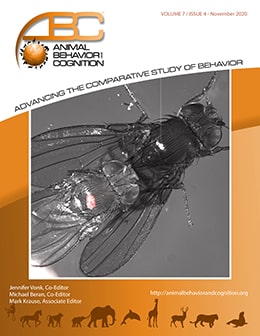Vol 7, Issue 4, November 2020
Task Aspects Triggering Observational Learning in Jackdaws (Corvus monedula)
Citation
Mioduszewska, B., Schleuning, X., Brunon, A., O’Hara, M., Auersperg, A. M. I., Federspiel, I. G., & von Bayern, A. M. P. (2020). Task aspects triggering observational learning in jackdaws (Corvus monedula) Animal Behavior and Cognition, 7(4), 567-588. doi: https://doi.org/10.26451/abc.07.04.08.2020
Abstract
Complex novel tasks are often used in animal cognition research to allow discrimination between various learning mechanisms. Successful performance relies on the capacity to identify informational cues from features in the environment. Additionally, observational learning is often considered more beneficial for survival than individual learning. Despite the importance of controlling task complexity, it can often be challenging to operationalize. This study investigated whether jackdaws, a highly social corvid species, can learn to drop stones inside a tube to release a reward after observing a trained conspecific. Additionally, it aimed to identify the underlying learning mechanisms and to detect the informational cues triggering learning. A research design was developed to highlight different aspects of the required action sequence. Experimental conditions included a conspecific model demonstrating the full sequence, parts of the sequence, consuming the reward without solving the task, and consuming the reward after the solution was demonstrated without a visible model. None of the 12 naïve jackdaws solved the task in pretests. Two subjects started solving in test sessions and they developed modified versions of the demonstrated action. Observing the full action sequence performed by a conspecific seemed to trigger learning. The majority of the subjects exhibited changes in their stone-oriented behavior, most likely due to stimulus and/or local enhancement. As predicted, jackdaws were influenced by conspecific model demonstrations when manipulating a complex novel foraging task. Factors contributing to the apparent task difficulty and directions for future studies are discussed within a tri-dimensional framework including the task, setup, and individuals.
Keywords
corvid, jackdaw, observational learning, task complexity, informational cues
